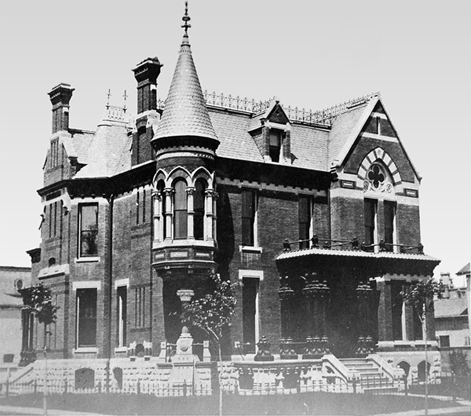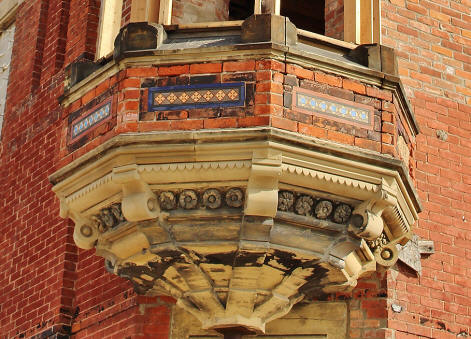| |
HGTV
show
receives
incentive
from
Michigan
Film
Office
for
Ransom
Gillis
House
project
in
Detroit
By
Wendell
Bryant/Tell
Us
Detroit
DETROIT,
MI (Tell
Us Det)
- An
extensive
renovation
of a
historic
Detroit
mansion
will be
broadcast
in prime
time in
November
to a
nationally
televised
audience
as an
eight-part,
yet to
be
titled
HGTV
series.
The
project
produced
by New
York-based
Chasing
Light
Entertainment
is
eligible
to
receive
a
$211,031
incentive
from the
Michigan
Film
Office.

The
Ransom
Gillis
House
brought
to
Detroit
the
Venetian
Gothic
style,
made
popular
by John
Ruskin's
book The
Stones
of
Venice.
The
centerpiece
of the
structure
was the
turret
situated
in the
front
left
corner,
the
circumference
of which
was
accented
by five
rows of
tiles of
simple
geometric
designs
in hues
of
bright
blue,
red,
yellow,
and
brown.
(Photos
by HB
Meeks/Tell
Us
Detroit)

Filming
began
last
month of
the
room-by-room
renovation
of the
historic
Ransom
Gillis
House in
the
city’s
Brush
Park, a
residential
district
several
blocks
north of
Ford
Field
and
Comerica
Park.
The
production
company
estimates
spending
$844,125
during
the
production
in
Detroit
while
hiring
22
workers,
including
12
Michigan
residents,
which
equate
to two
full-time
positions.
The
Ransom
Gillis
House
was
built at
a cost
of
$12,000
for
Ransom
Gillis,
a
wholesale
dry
goods
merchant.
The
property
was sold
by
Gillis
in 1880.
The
house
and
property
passed
though
the
hands of
four
different
upper-income
families
between
1876 and
1919.
After
this
time the
main
structure
was
converted
into a
rooming
house,
along
with
most of
the
other
structures
on the
street.

This
spring
Nicole
Curtis
from the
HGTV
series,
Rehab
Addict,
announced
that she
will be
restoring
the home
on the
TV show.
Curtis
spoke of
the
project
saying
"The
energy
here
[Detroit]
is
unreal
and it's
unmatched
anywhere
else.
For
doing
what I
do, to
be in a
city
that's
excited
for us
to be
here and
not
fighting
us? It's
a huge
thing."
Work on
the
house
began
this
summer.
Curtis
will
lead the
renovation
of the
1876-built
mansion
for an
eight-part
HGTV
series
to be
sponsored
by
Quicken
Loans,
the
online
mortgage
lender.
(Photo
by HB
Meeks/Tell
Us
Detroit)
This
renovation
marks
the
start of
construction
for the
Brush
Park
Development
Company
(BDPC)
development
which
was
announced
in May
2015 by
the City
of
Detroit.
Utilizing
the help
of
community
volunteers,
the
joint
Quicken
Loans
and HGTV
project
will
restore
the
Ransom
Gillis
home to
its
former
glory.
The
series
will
also
feature
Quicken
Loans
President
Jay
Farner
in
several
episodes.

Quicken
Loans
President
Jay
Farner
describe
to the
media
what the
plans
are for
restoring
the
Ransom
Gillis
House
during a
summer
press
conference.
The
series
will
also
feature
Farner
in
several
episodes.
(Photo
by HB
Meeks/Tell
Us
Detroit)
“Brush
Park is
a vital
neighborhood
that is
about to
see a
significant
investment
in
revitalization
and new
construction.
Once
completed,
this
area is
going to
become
an
anchor
for the
growth
of
Detroit’s
neighborhoods,”
Farner
said.
“Communities
are
built
brick-by-brick,
through
effort
and
passion.
I am
proud to
say we
have all
of that
here
with
this
community,
Nicole
and this
amazing
home.”
“The
show
shines a
timely
spotlight
on the
exciting
residential
developments
in
Detroit,”
said
Jenell
Leonard,
commissioner
of the
Michigan
Film
Office.
“We’re
looking
forward
to the
positive
impact
of show,
and
especially
supporting
a
project
that
highlights
the
revitalization
of the
state’s
largest
urban
area.”
Earlier
this
summer,
legislation
was
signed
into law
eliminating
the
program
for film
and
digital
media
incentives.
Incentive
agreements
for
these
two
films
were
approved
before
this
legislation
took
effect.
Any film
or
digital
media
project
approved
and
issued a
fully
executed
agreement
prior to
the
signing
of the
legislation
will be
administered
in
accordance
with the
law.
Michigan
Film
Office
is no
longer
accepting
applications
for
projects
seeking
incentives.
Michigan
Film
Office
was
established
in 1979.
The
office
assists
and
attracts
production
companies
and
promotes
the
growth
of
Michigan’s
film,
television
and
digital
media
production
industries.
For more
information,
please
visit
Michigan
Film
Office.
|